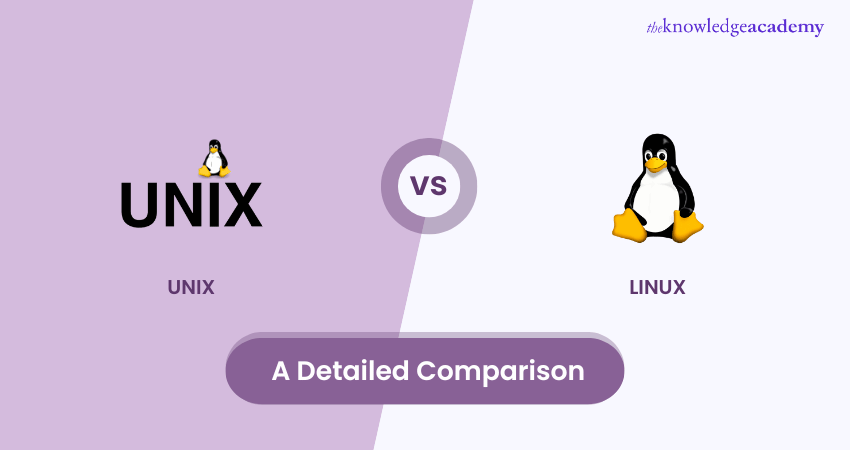Unix vs. Linux
 Anish Agrawal
Anish Agrawal
When it comes to operating systems, Unix and Linux are often mentioned in the same breath due to their shared history and similar commands. However, they have significant differences in terms of origin, architecture, usage, licensing, and adaptability. In this blog, we’ll explore the key aspects of both Unix and Linux, helping you understand their similarities and distinctions.
1. Origin and History
Unix: Unix was developed in the 1960s at AT&T's Bell Labs by Ken Thompson, Dennis Ritchie, and others. It was designed as a portable, multitasking system for programmers. Initially written in assembly language, it was soon rewritten in C, making it easier to modify and port to other machines.
Linux: Linux, on the other hand, was created by Linus Torvalds in 1991. It was designed as a free, open-source alternative to Unix. Torvalds initially developed the Linux kernel and, with contributions from developers worldwide, it evolved into a full-fledged operating system. Linux is not directly derived from Unix but was inspired by its architecture and principles.
2. Kernel and Architecture
Unix: Unix systems are typically monolithic kernels, where the kernel handles multiple tasks such as managing processes, memory, and hardware communication. Unix was designed for mainframe computers and has historically been used in servers and high-performance computing systems.
Linux: Linux also uses a monolithic kernel, but with added modularity, allowing components to be dynamically loaded or unloaded. This flexibility makes Linux suitable for a wider range of devices, from small embedded systems to large-scale servers.
3. Licensing and Availability
Unix: Unix is a proprietary operating system. Different variants of Unix, such as AIX (IBM), Solaris (Oracle), and HP-UX (HP), require commercial licenses. As a result, Unix is typically found in enterprise-level computing environments.
Linux: Linux is distributed under the GNU General Public License (GPL), making it an open-source operating system. This means anyone can view, modify, and distribute its code. Linux is freely available, and numerous distributions (or “distros”) have been created, including popular ones like Ubuntu, Fedora, Debian, and CentOS.
4. User Base and Use Cases
Unix: Unix is widely used in large-scale, mission-critical systems, particularly in fields like finance, telecommunications, and government operations. The stability and reliability of Unix make it a popular choice for high-end servers and supercomputers.
Linux: Linux is incredibly versatile and is used across various industries, from servers to desktop systems and mobile devices (Android is based on the Linux kernel). It's a favorite in the open-source community, powering web servers (Apache, Nginx) and cloud services (AWS, Google Cloud).
5. File System and Structure
Unix: Unix and Unix-like systems typically adhere to a standardized filesystem hierarchy. Unix offers different file systems (UFS, ZFS), depending on the vendor-specific version.
Linux: Linux follows the Filesystem Hierarchy Standard (FHS), which defines the directory structure. Common file systems used in Linux include ext4, XFS, and Btrfs. Linux supports a wide variety of file systems, making it more adaptable in different environments.
6. Security
Unix: Unix systems have long been known for their robust security, especially in corporate settings where multi-user environments are critical. However, being a proprietary system means that vulnerabilities are typically handled by the specific vendor.
Linux: Linux also provides excellent security features and is widely regarded for its open-source model, where the community contributes to finding and patching vulnerabilities quickly. Linux allows fine-grained control over permissions and user management, making it a strong choice for secure environments.
7. Community and Support
Unix: Unix has a smaller, more specialized user base due to its proprietary nature. Support typically comes through official channels, and system administrators need specific knowledge about the variant they are using.
Linux: Linux boasts a vast community of developers, users, and enthusiasts who contribute to its development and maintenance. This large support base makes it easy for users to find help through forums, documentation, and mailing lists. Additionally, Linux has commercial support options available through companies like Red Hat and Canonical.
8. Performance and Flexibility
Unix: Unix is designed for performance and stability, especially in environments that demand consistent uptime, such as servers and critical systems. However, Unix is less flexible compared to Linux when it comes to adaptation across various hardware platforms.
Linux: Linux's modular architecture allows it to be tailored to specific needs, making it incredibly flexible across a wide range of devices. Linux is often praised for its scalability and ability to run on everything from embedded systems to supercomputers.
9. Desktop Usage
Unix: Unix systems were not primarily designed for desktop use, although they can be used in this way in specific environments. Most Unix systems lack the modern graphical environments and user interfaces expected by today’s desktop users.
Linux: Linux has evolved to support user-friendly desktop environments such as GNOME, KDE, and XFCE. With distributions like Ubuntu and Fedora, Linux has become more accessible to general users, offering a wide range of software and tools for everyday tasks.
10. Conclusion: Which One to Choose?
Unix: If you're working in a high-end enterprise environment that requires extreme reliability and support, Unix might be your go-to choice. It’s favored by industries that need highly stable systems with long-term support.
Linux: For general users, developers, and tech enthusiasts, Linux is often the more attractive option. Its open-source nature, flexibility, and widespread adoption make it ideal for a wide range of applications. Whether you're setting up a server, a desktop system, or even a mobile app development environment, Linux is likely the better choice.
While Unix laid the groundwork for modern operating systems, Linux has carried the torch forward, becoming one of the most popular operating systems in the world. Their shared history doesn’t take away from the distinct paths they’ve followed, each excelling in different areas and serving different audiences.
What are your thoughts? Feel free to comment below and share your experience with Unix or Linux!
Subscribe to my newsletter
Read articles from Anish Agrawal directly inside your inbox. Subscribe to the newsletter, and don't miss out.
Written by
